Text
anyway since pride month is coming up and my local barnes and nobey has once again decided to only put young adult books in their corporate mandated rainbow display, y'all want some queer reading recs that aren't YA?
23K notes
·
View notes
Text
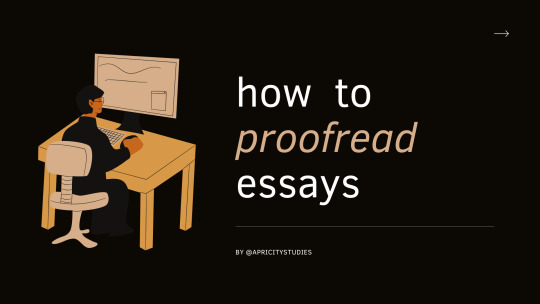
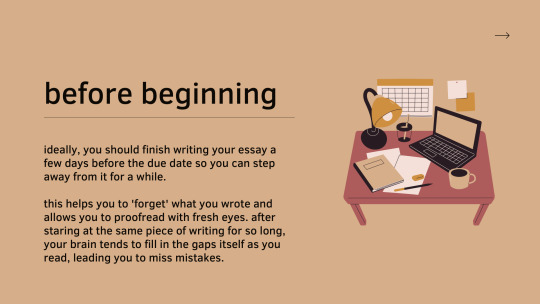
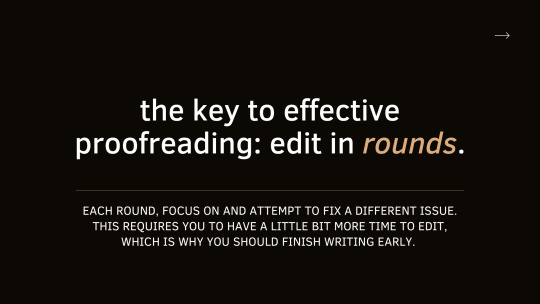
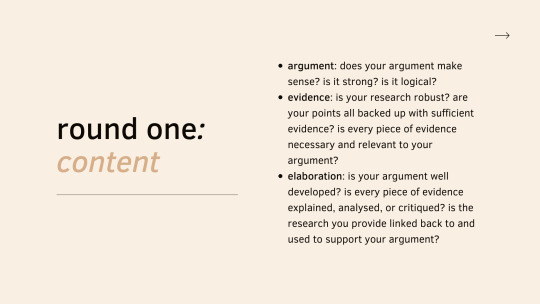
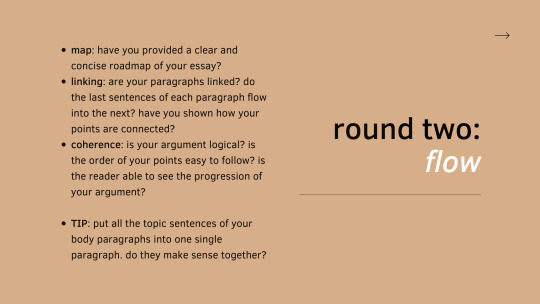
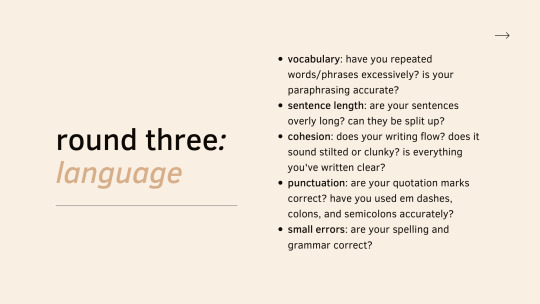
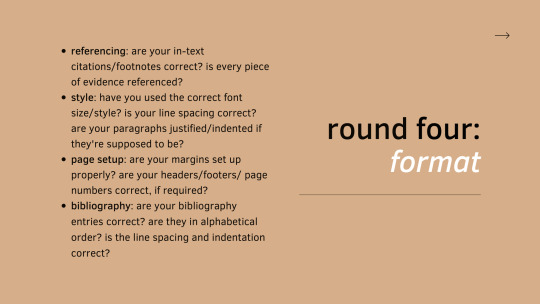
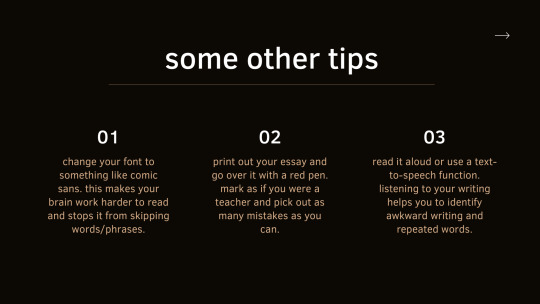
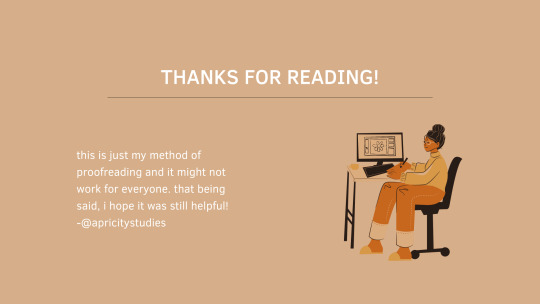
here’s a quick guide on how i proofread and edit my essays as an humanities undergrad! i tend to spend more time on research and editing and much less time on writing and my first drafts are often horrendous, so editing is really important for me :^)
i’ve also created guides on essay preparation, the 5-paragraph essay, how to research, and how to write essays. you can find all my other masterposts here.
transcript below:
Keep reading
7K notes
·
View notes
Text
Plot Development : A Collection

Patreon || Ko-Fi || Masterlist
–
General
31 Days of Plot Development : January 2019 Writing Challenge
Resources For Plot Development
Guide To Plot Development
Tackling Subplots
Tips on Planning A Series
Plot Elements
How To Write A Good Plot Twist
How To Foreshadow
Character Driven vs. Plot Driven Stories
Plot Structure
How To Engage The Reader
Pacing Appropriately
Tips on Introducing Backstory
Tips on Writing Flashbacks
Tips on Writing Time Skips
Foreshadowing The Villain
Too Much Symbolism? Too Much Foreshadowing?
Outlining
Novel Planning 101
Coming Up With Scene Ideas
Planning A Scene
When To Stop Planning
How To Outline Outside Chapter Structure
Tips on Mapping Out A Series
Outlining By Chapter
How To Outline Effectively
How To Write A Story Timeline
Coming Up With “Original” Ideas
Guide to Episodic Plot Structure
Theme
Commentary on Social Issues In Writing
On Writing About Sensitive Topics
Avoiding The Romanticization of Mental Illness
Writing Stories About Your Own Experiences
Writing Meaningful Stories
Tips on Writing Grief
Ultimate Guide To Symbolism
Multiple themes in a story
Execution
Things A Reader Needs From A Story
How To Turn A Good Idea Into A Good Story
Building Upon A Good Premise
Developing Complicated Plots Around Characters
–
Masterlist
If you enjoy my blog and wish for it to continue being updated frequently and for me to continue putting my energy toward answering your questions, please consider Buying Me A Coffee, or pledging your support on Patreon, where I offer early access and exclusive benefits for only $5/month.
Shoutout to my $15+ patron, Douglas S.!
3K notes
·
View notes
Text
So. You want to garden.
For whatever reason. Right now as of uhhhh Friday March 27, of 2020, within the quarantine of COVID-19 you are most likely want to garden in order to feed your family as you want to save money from the grocery store. And to ya know. feed your family.
SO. Here’s some YouTube videos. Mainly from this one YouTuber since she runs her own farm. She talks about what to grow and how to grow as well as saving seeds. (Trust me, saving seeds is better in the long run.) You can also regrow kitchen scraps too if you feel like you’re unable to get any proper seeds. And for fun have a post apocalyptic type garden.
What to plant in a small garden:
youtube
Fast-food growing options:
youtube
The importance of Seed saving:
youtube
How to build an arched trellis for $30:
youtube
A complete guide to virtual gardening:
youtube
How to PLANT & GROW with cattle panel arched trellises:
youtube
14 store bought vegetables & herbs you can regrow:
youtube
Save your kitchen scraps, these 7 plants can be grown out of them:
youtube
9 survival gardening crops to grow in a post apocalyptic world:
youtube
24K notes
·
View notes
Photo
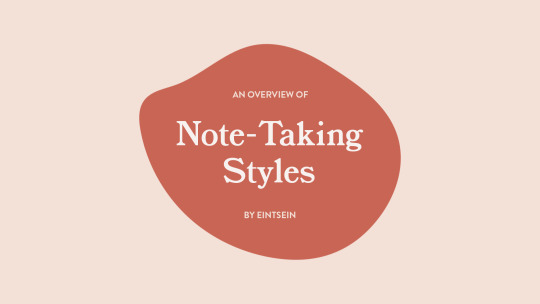

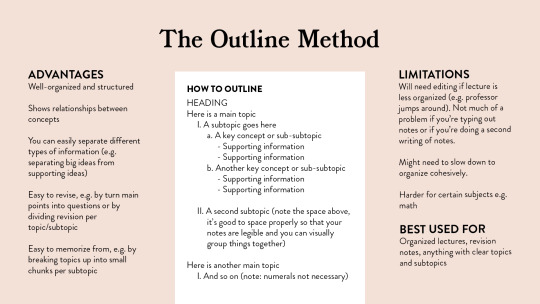
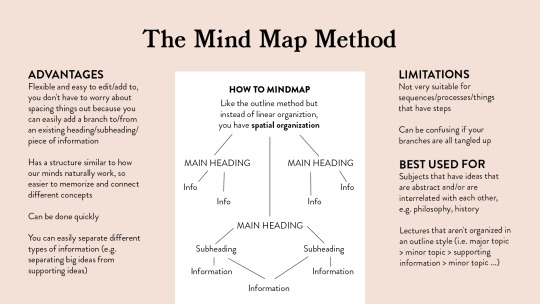

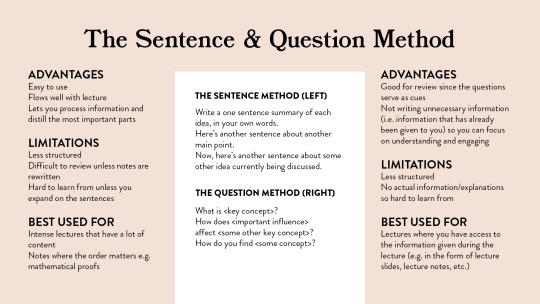
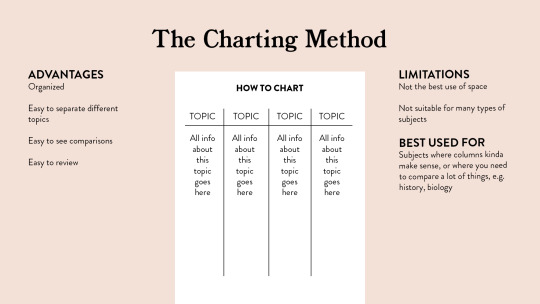


An Overview of Note-Taking Styles
Note-taking is one of the most essential skills a student should master. It allows you to record and review information to be used in the future. But what’s the best way to do so? Here’s an overview of note-taking styles that can help you maximize your learning!
56K notes
·
View notes
Photo
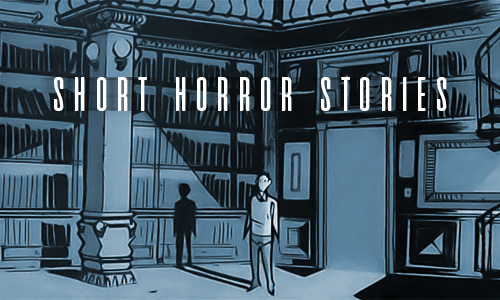
This is a compiled list of some of my favorite pieces of short horror fiction, ranging from classics to modern-day horror, and includes links to where the full story can be read for free. Please be aware that any of these stories may contain subject matter you find disturbing, offensive, or otherwise distressing. Exercise caution when reading. Image art is from Scarecrow: Year One.
PSYCHOLOGICAL: tense, dread-inducing horror that preys upon the human psyche and aims to frighten on a mental or emotional level.
“The Frolic” by Thomas Ligotti, 1989
“Button, Button” by Richard Matheson, 1970
“89.1 FM” by Jimmy Juliano, 2015
“The Yellow Wallpaper” by Charlotte Perkins Gilman, 1892
“Death at 421 Stockholm Street“ by C.K. Walker, 2016
“The Ones Who Walk Away from Omelas” by Ursula K. Le Guin, 1973
“An Empty Prison” by Matt Dymerski, 2018
“A Suspicious Gift” by Algernon Blackwood, 1906
CURSED: stories concerning characters afflicted with a curse, either by procuring a plagued object or as punishment for their own nefarious actions.
“How Spoilers Bleed” by Clive Barker, 1991
“A Warning to the Curious” by M.R. James, 1925
“each thing i show you is a piece of my death” by Stephen J. Barringer and Gemma Files, 2010
“The Road Virus Heads North” by Stephen King, 1999
“Ring Once for Death” by Robert Arthur, 1954
“The Mary Hillenbrand Cassette“ by Jimmy Juliano, 2016
“The Monkey’s Paw” by W.W. Jacobs, 1902
MONSTERS: tales of ghouls, creeps, and everything in between.
“The Curse of Yig” by H.P. Lovecraft and Zealia Bishop, 1929
“The Oddkids” by S.M. Piper, 2015
“Nightmare at 20,000 Feet” by Richard Matheson
“The Graveyard Rats” by Henry Kuttner, 1936
“Tall Man” by C.K. Walker, 2016
“The Quest for Blank Claveringi“ by Patricia Highsmith, 1967
“The Showers” by Dylan Sindelar, 2012
CLASSICS: terrifying fiction written by innovators of literary horror.
“The Tell-Tale Heart” by Edgar Allan Poe, 1843
“The Interlopers” by Saki, 1919
“The Statement of Randolph Carter“ by H.P. Lovecraft, 1920
“The Damned Thing” by Ambrose Pierce, 1893
“The Legend of Sleepy Hollow” by Washington Irving, 1820
“August Heat” by W.F. Harvey, 1910
“The Black Cat” by Edgar Allan Poe, 1843
SUPERNATURAL: stories varying from spooky to sober, featuring lurking specters, wandering souls, and those haunted by ghosts and grief.
“Nora’s Visitor” by Russell R. James, 2011
“The Pale Man” by Julius Long, 1934
“A Collapse of Horses” by Brian Evenson, 2013
“The Jigsaw Puzzle” by J.B. Stamper, 1977
“The Mayor Will Make A Brief Statement and then Take Questions” by David Nickle, 2013
“The Night Wire” by H.F. Arnold, 1926
“Postcards from Natalie” by Carrie Laben, 2016
UNSETTLING: fiction that explores particularly disturbing topics, such as mutilation, violence, and body horror. Not recommended for readers who may be offended or upset by graphic content.
“Survivor Type” by Stephen King, 1982
“I’m On My Deathbed So I’m Coming Clean…” by M.J. Pack, 2018
“In the Hills, the Cities” by Clive Barker, 1984
“The New Fish” by T.W. Grim, 2013
“The Screwfly Solution” by Racoona Sheldon, 1977
“In the Darkness of the Fields” by Ho_Jun, 2015
“The October Game” by Ray Bradbury, 1948
“I Have No Mouth, and I Must Scream” by Harlan Ellison, 1967
HAPPY READING, HORROR FANS!
53K notes
·
View notes
Photo
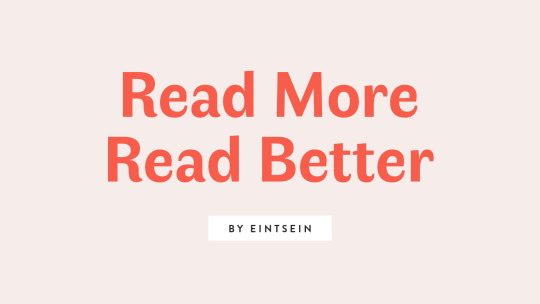

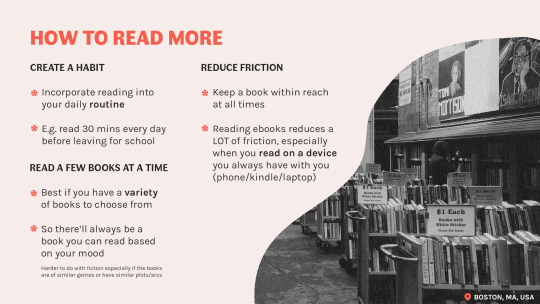
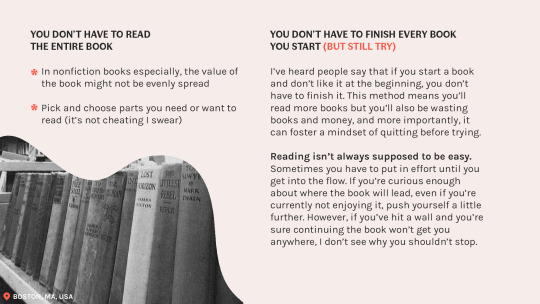
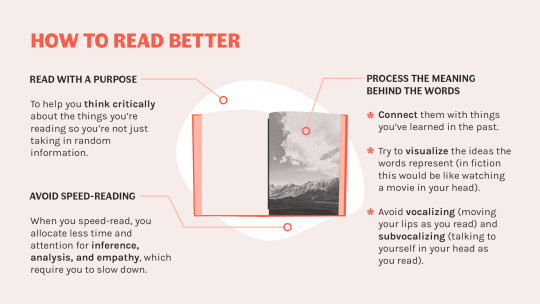
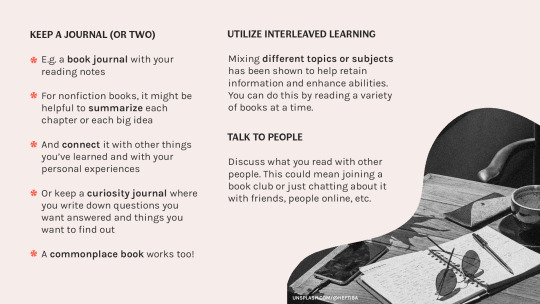
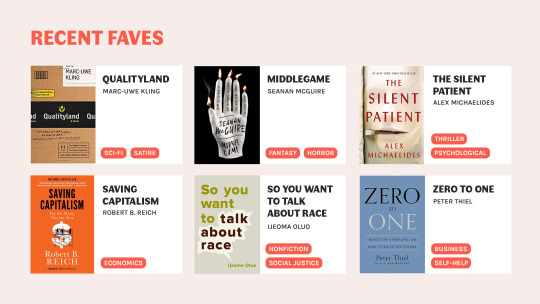

Read More, Read Better
Many of us are looking for more ways to enjoy our time at home in these stressful circumstances. Some of us have turned to books. But how can we make sure we get the most out of them?
Keep reading
24K notes
·
View notes
Text
small writing exercises
make up an origin and meaning of a name
write a family history going back centuries
pick a character and make them ramble about their favorite thing
make up a fable, pretend it’s as famous as the Grimm fairytales. how does this fable affect the world and what would people reference from it? (i love this one because it can be as crazy and silly as you want)
make a commercial for something that really shouldn’t be sold at all. try to convince people to buy it.
ACRONYMS. but, like, try to have it make sense
make a poem about your story/something in your story
rewrite a classic but put your own twist on it
make up a detailed recipe
make a monologue with a plot twist or punchline in the end
create a ridiculously detailed timeline for a character
childhood memory (real one or make it up!)
improv rap lyrics
the story behind an inside joke
make up a mythical creature
pretend to be a commentary youtuber and pick a topic
the what if? pick a story and create an alternate ending to it
pick one scenario and several characters. how different are the reactions based on their personalities?
20K notes
·
View notes
Text
those who dream only by night: the gothic short stories rec list
have you ever felt like you want to read more fiction in the gothic tradition, but you haven’t the money or the time, or you’re the sort of person who only reads a novel if you’re sure you like the writer? i can help with that! here is a list of short stories, novellas, and one poem, all of which are important in the gothic tradition, the gothic revival, or contemporary gothic fiction, and they are all on the internet! for free! (i enjoy making rec lists, but i particularly enjoy making rec lists where i know that everyone who reads the list can get all of it for free.) so, take a night, make some hot chocolate, and frighten the life out of yourself. you’ll thank me!
manfred by lord byron (1817)
the tell tale heart by edgar allan poe (1843)
carmilla by sheridan le fanu (1872)
lord arthur savile’s crime by oscar wilde (1887)
the yellow wallpaper by charlotte perkins gilman (1892)
lot no. 249 by arthur conan doyle (1892)
the great god pan by arthur machen (1894)
the turn of the screw by henry james (1898)
the monkey’s paw by w.w. jacobs (1902)
sredni vashtar by saki (1911)
casting the runes by m.r. james (1911)
the damned by algernon blackwood (1914)
the tomb by h.p. lovecraft (1922)
the garden party by katherine mansfield (1922)
a rose for emily by william faulkner (1930)
the lottery by shirley jackson (1948)
lamb to the slaughter by roald dahl (1953)
a good man is hard to find by flannery o’connor (1955)
the company of wolves by angela carter (1979)
i, cthulhu by neil gaiman (1986)
29K notes
·
View notes
Text
here have 10 pieces of writing advice that have stuck with me over the years
every character’s first line should be an introduction to who they are as a person
even if you only wrote one sentence on a really bad day, that’s still one sentence more than you had yesterday
exercise restraint when using swear words and extra punctuation in order for them to pack a punch when you do use them
if your characters have to kiss to show they’re in love, then they’re not in love
make every scene interesting (or make every scene your favorite scene), otherwise your readers will be just as bored as you
if you’re stuck on a scene, delete the last line you wrote and go in a different direction, or leave in brackets as placeholders
don’t compare your first draft to published books that could be anywhere from 3rd to 103rd drafts
i promise you the story you want to tell can fit into 100k words or less
sometimes the book isn’t working because it’s not ready to be written or you’re not ready to write it yet; let it marinate for a bit so the idea can develop as you become a better writer
a story written in chronological order takes a lot more discipline and is usually easier to understand than a story written with flashbacks
74K notes
·
View notes
Text
52 short stories in 52 weeks
1. A story entitled “A New Beginning”.
2. A story about rising to a challenge.
3. A retelling of a fairytale.
4. A story about three siblings.
5. A story set in London.
6. A story about finding something that has been lost.
7. A story about a journey.
8. A story set during a war.
9. A creepy story.
10. A story featuring a countdown.
11. A story set at a full moon.
12. A story about a contest or competition.
13. A story that takes place entirely inside a vehicle.
14. A story from a villain’s perspective.
15. A story set at a concert or festival.
16. A story that begins with a gunshot.
17. A story set in a country you’ve never been to.
18. A story about a historical figure.
19. A story set in a theatre.
20. A story written in 2nd person narrative.
21. A story set on another planet.
22. A story written from the perspective of someone dead/undead
23. A story about a birthday.
24. A story that ends on a cliffhanger.
25. A story set at the summer solstice.
26. A story about nostalgia.
27. A story that features a song or poem.
28. A story that ends at sunrise.
29. A story opening with the words “F*** you!”
30. A story about a magical object.
31. A story set at sea.
32. A story about a curse.
33. A story set 100 years in the future.
34. A story about loneliness.
35. A story that features a real recent newspaper article.
36. A story written from an animal’s perspective.
37. A story about a scientific discovery.
38. A story inspired by a recently observed stranger.
39. A story with only one character.
40. A story about a secret.
41. A romance that ends in tragedy.
42. A tragedy that ends in romance.
43. A retelling of a recent Hollywood movie.
44. A story that takes place the year you were born.
45. A story about a near-death experience.
46. A story about anger.
47. A story about a magic spell.
48. A story set in a strange small town.
49. A story about justice being done.
50. A creation myth.
51. A story set at Christmas.
52. A story entitled “The End”.
29K notes
·
View notes
Note
Hello! Would you mind doing an example of not using filter words in a first person point of view? While I know that you can just switch out the pronouns for I/me/my, I just want to see it in action and when you should (and shouldn't) use the filter words. Thank you!
Hi there! I would love to! I think I’ll start out with an example with filter words and then cut out the filter words to show you the difference.
For those of you who haven’t seen my post on Filter Words.
Now, for the example:
I felt a hand tap my shoulder as I realized I had made a huge mistake. I knew the consequences would be unsettling, but I had no other choice. I saw the light of my desk lamp bounce off of the officer’s badge before I had even turned around. It seemed like I always found my way into trouble.
It was the first thing off the top of my head, so it’s a bit rough sounding….
Now for without filter words (And a bit of revision):
A hand tapped my shoulder as it dawned on me: I had just made a huge mistake. The consequences would be unsettling if I didn’t get out of this mess, but I had no other choice. The light of my desk lamp bounced off of the officer’s badge. I always found my way into trouble.
By taking out filter words, you get right to the point.
I’d also like to add a few more notes that I didn’t have the chance to post previously.
Some Examples of Filtering:
I heard a noise in the hallway.
She felt embarrassed when she tripped.
I saw a light bouncing through the trees.
I tasted the sour tang of raspberries bursting on my tongue.
He smelled his teammate’s BO wafting through the locker room.
She remembered dancing at his wedding.
I think people should be kinder to one another.
How can you apply this?
Read your work to see how many of these filtering words you might be leaning on. Microsoft Word has a great Find and Highlight feature that I love to use when I’m editing. See how you can get rid of these filtering words and take your sentences to the next level by making stronger word choices. Take the above examples, and see how they can be reworked.
FILTERING EXAMPLE: I heard a noise in the hallway.
DESCRIBE THE SOUND: Heels tapped a staccato rhythm in the hallway.
FILTERING EXAMPLE: She felt embarrassed after she tripped.
DESCRIBE WHAT THE FEELING LOOKS LIKE: Her cheeks flushed and her shoulders hunched after she tripped.
FILTERING EXAMPLE: I saw a light bouncing through the trees.
DESCRIBE THE SIGHT: A light bounced through the trees.
FILTERING EXAMPLE: I tasted the sour tang of raspberries bursting on my tongue.
DESCRIBE THE TASTE: The sour tang of raspberries burst on my tongue.
FILTERING EXAMPLE: He smelled his teammate’s BO wafting through the locker room.
DESCRIBE THE SMELL: His teammate’s BO wafted through the locker room.
FILTERING EXAMPLE: She remembered dancing at his wedding.
DESCRIBE THE MEMORY: She had danced at his wedding.
FILTERING EXAMPLE: I think people should be kinder to one another.
DESCRIBE THE THOUGHT: People should be kinder to one another.
See what a difference it makes when you get rid of the filter? It’s simply not necessary to use them. By ditching them, you avoid “telling,” your voice is more active, and your pacing is helped along.
The above list is not comprehensive as there are many examples of filtering words. The idea is to be aware of the concept so that you can recognize instances of it happening in your work. Be aware of where you want to place the energy and power in your sentences. Let your observations flow through your characters with immediacy.
Ok, sorry for the lengthy answer, I know you just wanted an example…. sorry!
If you have any questions, feel free to ask at my ask box
69K notes
·
View notes
Text
Academic Writing Resources
General:
The Five-Paragraph Essay
Using Punctuation Marks
Deadly Sins Checklist
Formatting Your Paper
Writing About Literature
Basic Essay
Revision Checklist
Planning and Organization
Editing and Proofreading
Latin Terms
Essay Structure
Tips on Introducing Quotes
Academic Writing Tips
Introductions:
Introductory Paragraphs
Introductions
Writing an Introduction
Preparing to Write an Introduction
Introduction Strategies
The Introductory Paragraph
Writing Effective Introductions
In The Beginning
Introductions and Conclusions
The Introductory Paragraph
Writing Introductory Paragraphs
How to Write an Intro
Body Paragraphs:
Paragraph Development and Topic Sentences
Transitions
Transitions
Transitions
Four Components of an Effective Body Paragraph
Writing Paragraphs
Paragraph Development
Body Paragraphs
Body Paragraphs
Strong Body Paragraphs
Body Paragraphs
Writing Body Paragraphs
How to Write Body Paragraphs
Writing the Body
Writing Body Paragraphs
Body Paragraphs
Body Paragraphs that Defend a Thesis
How to Write Body Paragraphs
The Perfect Paragraph
Topic Sentences:
Topic Sentences
Writing Topic Sentences
Topic Sentences
Topic Sentences
The Topic Sentence
Paragraphs and Topic Sentences
The Topic Sentence
Topics, Main Ideas, and Topic Sentences
Writing a Good Topic Sentence
Good Topic Sentences
Conclusions:
Writing Effective Conclusions
Introductions and Conclusions
Conclusion Paragraphs
Conclusion Strategies
Conclusions
Tips for a Strong Conclusion
The Concluding Paragraph
Ending the Essay
Types of Conclusions
Writing a Strong Conclusion
How to Write a Conclusion
Writing Conclusions
Guide to Conclusions
Thesis Statements:
The Thesis Statement
Thesis Statements
Writing a Thesis Statement
Thesis Statement
Tips and Examples
Writing a Thesis
Writing the Thesis
How to Write Your Thesis
The Thesis
Thesis Statements
Guidelines for Writing a Thesis
Thesis Statements
Thesis
Thesis Statements
The Thesis
Create a Strong Thesis
How to Write a Thesis
Developing a Thesis
Guide to Writing Thesis Statements
Thesis Statements
Citing:
When to Cite
APA Documentation
MLA Documentation
Suggestions for Citing Sources
Research and Citation Resources
Citation Information
MLA Guidelines for Citing Poetry
MLA Style for Poetry
How to Format Your Paper
Argumentative Essays:
Argumentative Essays
Argument
Argumentative Essays
Persuasive or Argumentative Essays
Argumentative Essay
Argument/Argumentative
Argumentative Essays
How to Write a Good Argument
How to Write an Argumentative Essay
Writing Conclusions to Argumentative Essays
Argumentative Essay
Persuasive Essay Writing
Writing Concluding Paragraphs
Constructing the Argumentative Essay
Writing About Poetry:
Writing About Poetry
Writing About Poetry
Writing About Poetry Q & A
Poetry Explications
Writing About Poetry
Writing About Poems
Explicating a Poem
Writing About Poetry
Writing a Thesis Paper About a Poem
How to Start a Poetry Introduction
Poetry Essay Structure
Poetry Explication
Expository Essays:
Structure of a General Expository Essay
Expository Essay Examples
Sample Expository Essay
Expository Writing
Expository Essay Model
Elements of Expository Essays
Expository Writing Information
Expository Essays
Writing Expository Essays
How to Write an Expository Essay
Tips on Writing an Expository Essay
Expository Essays
Essay Map
Writing Expository Essays
How to Create a Strong Expository Essay
Expository Essay Writing
The Expository Essay
Research Papers:
How to Write a Research Paper in Literature
Writing a Research Paper
The Research Paper
How to Write a Research Paper
Five Paragraph Research Paper
Sample Research Paper
Writing a Research Paper
Tips for a Research Paper
How to Write a Research Paper
Writing a Scientific Research Paper
Writing Research Papers
Research and Writing
Research Papers that Rock
How to Write an Effective Research Paper
College Application Essays:
Application Essay Tips
Application Essays
Tips
10 Tips
Application Essays
How to Write a College Application Essay
Tips for an Effective Essay
Do’s and Don’t’s
College Application Essay
How to Write a College Application Essay
Narrative Essays:
Narrative and Descriptive
Narrative Essay Writing
The Personal Essay
Narrative Essays
Narrative Essays
Writing Narrative Essays
Narrative/Descriptive
Narrative Essay
Writing a Narrative Essay
Tips on Writing a Narrative Essay
96K notes
·
View notes
Text
Foolproof Guide to School Success!

Hi! I just finished my first year of college and I definitely have to credit the studyblr community for all the useful information and tips! I currently closed the year with a 4.0 and don’t plan on stopping!
In high school I was an ok student but I decided to change all that when I started college. So, whether you’re in high school or college, it’s never late to change and attain academic excellence! So here are my tips!
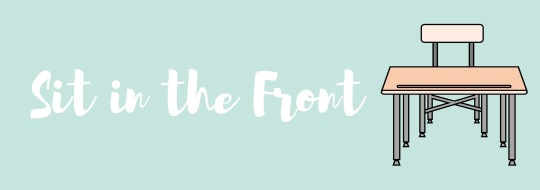
Try to get an early start on your day and sit closest to the front as possible. Studies show that sitting in the front of class will improve your grades and knowledge!
A study showed that those who sat in the front achieved an average of 80% while those in the middle achieved an average of 71.6% on their exams. And guess who did even worse.. unfortunately those in the back scored an average of 68.1%
Distractions are decreased because there’s no one sitting in front of you, just the lecture which basically forces you to pay attention.
This increases the likelihood of your professor getting to know you. Why is that important? Well, in an accounting course I once took, I sat in the front, attended extra tutoring sessions hosted by that instructor, and generally put in extra effort in the class. By the end of the semester everyone was really struggling, over 20 students flunked out, and even my tips weren’t getting me to that A I wanted. Well, because I had established who I was and that I was serious about the class, my instructor bumped my final course grade from an 88% to 93%! She said she noticed the effort I put in so she gave me the grade she thought I deserved
Seriously, sit in the front!!

Ok, now that you have a good spot in the class, make sure you take great notes! The Cornell notes system is great but do whatever works best for you.
Abbreviate often
Date your notes at the top so you can order them chronologically. This will make studying a breeze later on.
Find a color coding system that works for you. Highlight main ideas and vocab.
Find a notebook that works for you. I was lucky enough to score 20 moleskines at my local thrift store at 1 dollar a piece so I’ve been using those.
If you prefer loose leaf paper, buy a bunch and stick it into a flexible binder so you can organize and reorganize your paper.
Use post-its and sticky tabs to add extra info that you might have left out during class. Use sticky tabs to find certain notes faster.
These are some of my favorite note taking supplies:
These Pilot G-Tec pens are some of my favorite pens ever! They are super smooth and the lines are really fine. This 5 pack costs around $11 which is pretty affordable!
Mead notebooks are a classic staple. Seriously these are super durable!
These sticky post-it tab hybrids work really well for marking a page and highlighting important info.
Mildliners are really nice and the colors are not to bright. A pack runs around $7 and a 3 pack is $15 on Amazon.
If you want to go the extra mile, retyping up your notes is a great idea. That way your in class notes can be messy and it won’t matter since you’re going to type them up anyway. One Note is awesome for notes.
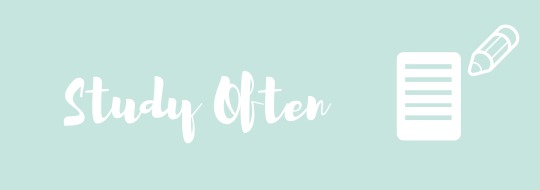
I developed my own system for deciding on how I will study and how often I will study. It goes something like this:
Rank your classes in order of difficulty into three sections:
Easy, medium, and hard….
Easy classes get one point
Medium classes get two points
Hard classes get three points
Is the class math related? ….. add 2 points
Is it science related? …… add 2 points
Is the class a subject that you struggle with? ….. add 3 points
is the class AP? ……… 3 points
Add up the points for each class.
Classes with 1-3 points:
these classes are generally easy and have an easy instructor, contain info you already know, etc.
These classes get 45 minutes a day in your schedule and minimal studying on weekends.
Classes with 4-8 points:
These classes might need some more effort so try to…
Set aside an hour a day and 30 minutes on weekends.
Classes with 9 points and up:
These classes are usually more intense, have daily assignments, have a strict instructor, etc.
Set 2 hours a day and an hour or more on weekends. Consider going to free tutoring provided by your school, join a study group, or go to your instructor’s office hours.

Plan your months, weeks, and days in advance! Keep a planner, calendar, or bullet journal. I personally use a bullet journal and keep a calendar printable in each binder I have for my classes.
Include due dates, exam dates, when your rentals are due, etc.
Look at it everyday!!! That way you won’t forget important events.
If you want to, make it pretty! Decorate it with stickers, pictures, polaroids, etc. to make it more personal.
If you prefer minimalism, keep a simple planner or bullet journal system.
If an electronic system works better for you, go for it! But I’ve noticed that writing it on paper works best!
Here are some great planners or journals to use:
Moleskines are always a great choice!
This hardcover Yoobi journal is comparable to the Moleskine and comes in pretty colors! The price is awesome, each one runs at $6!
Bando makes super pretty and trendy planners. They run from $20 and can get pricey though. It’s definitely worth it though!
This Sugar Paper gold polka dot planner is really cute and super affordable!
The AT-A-GLANCE planner has a monthly view and daily sections with plenty of room for writing in important dates and decorating with cute stuff!
Kikki K has amazing planners. If you want to splurge consider their stuff. I’ve always wanted one but it’s around the price of a textbook :(

While Studyblr has so many resources and tips, in case you haven’t noticed, a lot of the pretty pictures use muji pens, staedtler fineliners, and those cute lil’ backpacks. Remember that you have to use supplies that work with you. Here are the essentials to carry with you:
Notebooks and binders
A sturdy and comfy backpack. I use the Borealis backpack by The North Face on discount. Make sure it has comfortable straps, back support, enough room for all your stuff, and compartments for your food and water bottle.
A phone charger. Keep it in your backpack. My phone has died on me so many times and it sucks, especially if you have to take the bus. Invest in a portable charger.
Earbuds are a must, especially if you take public transportation. Also great for when you’re at the library, gym, etc.
As previously mentioned, a water bottle and FOOD! Pack a lunch but also have backup snacks like granola bars or nuts. You need food and water for energy.
Keep extra change. You never know when you need it!!
Your planner.
Pens, pencils, etc. Especially a stapler if you have homework that you regularly turn in!! Its really awk when someone doesn’t have a stapler and everyone in the class doesn’t either..
A laptop, seriously a must! Chromebooks are affordable!
Hope that’s helpful! Looking forward to another year in college and staying in the Studyblr community,
Thania
15K notes
·
View notes
Text
Free Online Language Courses
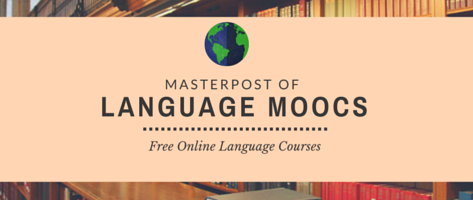
Here is a masterpost of MOOCs (massive open online courses) that are available, archived, or starting soon. I think they will help those that like to learn with a teacher or with videos. You can always check the audit course or no certificate option so that you can learn for free.
American Sign Language
ASL University
Sign Language Structure, Learning, and Change
Arabic
Arabic Without Walls
Madinah Arabic
Moroccan Arabic
Armenian
Depi Hayk
Bengali
Learn Bangla (Register to see course)
Catalan
Parla.Cat
Speak Cat
Chinese (Mandarin)
Beginner
Chinese for Beginners
Chinese Characters for Beginners
Chinese for HSK 1
Chinese for HSK 2
Chinese for HSK 3 I & II
Chinese for HSK 4
Chinese for HSK 5
Mandarin Chinese Level I
Mandarin Chinese Essentials
Mandarin Chinese for Business
More Chinese for Beginners
Start Talking Mandarin Chinese
UT Gateway to Chinese
Intermediate
Intermediate Business Chinese
Intermediate Chinese Grammar
Mandarin for Intermediate Learners I
Dutch
Introduction to Dutch
English
Online Courses here
Resources Here
Faroese
Faroese Course
Finnish
A Taste of Finnish
French
Beginner
AP French Language and Culture
Elementary French I & II
Français Interactif
Vivre en France - A1
Vivre en France- A2
Intermediate & Advanced
French Intermediate course B1-B2
Passe-Partout
Travailler en France A2-B1
Vivre en France - B1
German
Beginner
Deutsch im Blick
German Project
German at Work
Goethe Institute
Gwich’in
Introduction to Gwich’in Language
Hebrew
Biblical Hebrew
UT Austin
Hindi
A Door into Hindi
Virtual Hindi
Icelandic
Icelandic 1-5
Indonesian
Learn Indonesian
Irish
Irish 101, 102, 103, 104, 105, 106, 107
Italian
Beginner
Beginner’s Italian I
Introduction to Italian
Intermediate & Advanced
AP Italian Language and Culture
Intermediate Italian I
Advanced Italian I
Japanese
Genki
Japanese JOSHU
Japanese Pronunciation
Marugoto Courses
Tufs JpLang
Korean
Beginner
First Step Korean
How to Study Korean
Introduction to Korean
Learn to Speak Korean
Pathway to Spoken Korean
Intermediate
Intermediate Korean
Norwegian
Introduction to Norwegian I, Norwegian II
Norwegian on the Web
Persian
Easy Persian
PersianDee
Polish
Online Course
Portuguese
Pluralidades em Português Brasileiro
Russian
Beginner
A1 Course
I speak Russian
Intermediate
B1 Course
B1+ Course
B2.1 Course
B2.2 Course
Spanish
Beginner
AP Spanish Language & Culture
Basic Spanish I, Spanish II
Spanish for beginners
Spanish for Beginners 1, 2, 3, 4, 5, 6
Spanish Vocabulary
Advanced
Corrección, Estilo y Variaciones
Leer a Macondo
Swahili
Online Course
Turkish
Online Course
Ukrainian
Read Ukrainian
Speak Ukrainian
Welsh
Beginner’s Welsh
Discovering Wales
Yoruba
Yorùbá Yé Mi
Multiple Languages
Ancient Languages
More Language Learning Resources & Websites!
Last updated: May 2019
214K notes
·
View notes
Text
Resources For Worldbuilding

Culture & Society
Creating Fictional Holidays
Music For Your Fantasy World
Creating Religions & Belief Systems
How to Design Your Diabolical Cult
Historically Accurate Sexism in Fantasy: Let’s Unpack That
Debate with the Squirrels: Sexism in Fantasy
Feudalism
Using Politics In Fantasy Fiction
Mythic Justice – Crime and Punishment in Your Fantasy World
Government Worldbuilding
Realistic Political Strife
A Politics Of Worldbuilding
Language
Creating a Language
The Language Construction Kit
The International Phonetic Alphabet – Audio Illustrations
Fantasy Name Generator
Geographic Names
Medieval Names Archive
Squid Name Generator
Model Languages
Xenolinguistics
History
Prehistory
Mythos
History
Today
Myths, Creatures, and Folklore
Encyclopedia Mythica
The Ancient History Encyclopedia
Using History as Inspiration for Fantasy
Victorian Era Family Day Life in England
Peasant Life in the Middle Ages
Everyday Life in the Middle Ages
English Monarchs
Feudal Japan
The Story and Structure of the Iroquois Confederacy
Science + Geography
Dimensions
Solar Bodies
Climatology
Planetary Geography
Water Geography
Cartography, Maps, Star Charts, and Writing
Fundamentals of Physical Geography
Dating of Middle-earth events, using Precession of the Equinoxes and Tidal Friction
Orbital Operations in Science Fiction
Planet Designer
Artificial gravity calculator
Natural gravity calculator
Selden’s Catalogs of Objects for Celestia
Medieval Technology
Defining the Source, Effects, and Cost of Magic
How to Create a Rational Magic System
Miscellaneous
/r/worldbuilding
Fantasy World Generator
SciFi World Generator
Focused Ambiguity: Using Metaphor in Fantasy Writing
Space Engine
Terragen
The Five foundations of Worldbuilding
Setting the Fantastic in the Everyday World
Support Wordsnstuff!
If you enjoy my blog and wish for it to continue being updated frequently and for me to continue putting my energy toward answering your questions, please consider Buying Me A Coffee.
Request Resources, Tips, Playlists, or Prompt Lists
Instagram // Twitter //Facebook //#wordsnstuff
FAQ //monthly writing challenges // Masterlist
16K notes
·
View notes
